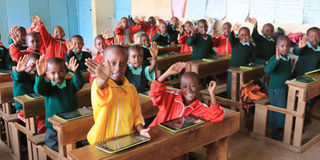Project to boost learning set for January roll out

Class One pupils of Roysambu Primary School study using computer tablets on July 1, 2016. Schools in 30 counties will benefit from a World Bank project. PHOTO | JEFF ANGOTE | NATION MEDIA GROUP
What you need to know:
- It targets 17,000 primary and 8,500 secondary teachers of science, mathematics and English in the schools.
- The Teachers Service Commission will receive Sh800 million for recruitment of teachers.
A Sh20 billion plan that seeks to improve the quality of education in primary and secondary schools is set to be rolled out in January next year.
The six-year project, that is being funded by the World Bank, will benefit schools in 30 counties across the country that are educationally and economically disadvantaged.
A detailed document by the government on the implementation of the programme dubbed Secondary Education Quality Improvement Project indicates that it will benefit 600,000 pupils in Class Seven and Eight and 600,000 students from Form One to Four.
CRITERIA
Further, it targets 17,000 primary and 8,500 secondary teachers of science, mathematics and English in the schools.
“These beneficiaries are from 7,852 public primary schools and 2,147 public secondary schools in the targeted sub-counties in 30 counties,” the document that was recently presented during a media workshop on curriculum review says.
The sub-counties have been identified based on the high incidence of poverty, low retention rates at primary schools and low transition rates to secondary institutions.
STUDENTS
The Teachers Service Commission will receive Sh800 million for recruitment of teachers and Sh1.5 billion for enhancing professional development of teachers.
The Education ministry will get Sh1.3 billion for provision of textbooks.
The document also indicates that Sh13.2 billion will be used to improve retention in Class Seven and Eight and transition to secondary schools.
Of the amount, Sh8.2 billion will go towards improving infrastructure while Sh5 billion will be used to improve retention of poor and vulnerable students.
EDUCATION
Kenya Institute of Curriculum Development (KICD) will get Sh2.1 billion for development and introduction of a competency-based curriculum while Sh800 million will be used to strengthen the national system for monitoring learning progress and national examinations.
Another Sh1.2 billion will be used for project management and coordination, monitoring and evaluation.
The government last week allocated Sh25 billion for the free day secondary education programme.
The money will be for infrastructure development to ensure 100 percent transition from primary to secondary school.
CURRICULUM
At the same time, KICD will require about Sh2.9 billion for implementation of the new curriculum.
The new curriculum will be rolled out in January from Class One to Three.
According to the implementation schedule, in 2019, the system will be rolled out in Standard Four to Six and in 2020 it will cover Standard Seven, Eight and Form One.
844SYSTEM
In 2021, the system will be extended to Form Two only and in the following year it will cover Form Three.
In 2023, it will be rolled out in Form Four.
The new system will replace the current Standard One to Form Four with Grade 1 to Grade 12.





